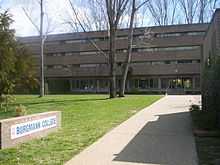Burgmann College
| Burgmann College | |
|---|---|
 The Burgmann College crest, representing the unification of churches and the waters of Lake Burley Griffin | |
| University | Australian National University |
| Location | Building 52 Daley Road, Australian National University, ACT 0200, Australia |
| Coordinates | 35°16′48″S 149°6′48″E / 35.28000°S 149.11333°ECoordinates: 35°16′48″S 149°6′48″E / 35.28000°S 149.11333°E |
| Established | 1971 |
| Named for | Ernest H. Burgmann |
| Status | Fully catered, co-educational |
| Principal | Philip Dutton |
| President | Maclaren Wall |
| Residents | 351 |
| Mascot | Black Cat/Panther |
| Website | Burgmann College |

Burgmann College is a residential college affiliated with the Australian National University in Canberra. Established in 1971, it is the only Australian college to combine undergraduate accommodation with a substantial postgraduate student body. It houses 351 students, roughly one-third of whom are postgraduates. Burgmann College is located inside the western corner of the campus, close to the waters of Lake Burley Griffin.
The college is named after Ernest H. Burgmann (1885-1967), the progressive Anglican Bishop (of Goulburn from 1934, and Canberra and Goulburn from 1950 to 1960) whom Prime Minister Robert Menzies once described in Parliament as a "most meddlesome priest".
Burgmann and neighbouring John XXIII College are the only remaining independent residential colleges among the Australian National University's ten halls of residence. Burgmann and John XXIII continue to administer their own admissions processes separate from the university's central clearinghouse for accommodation.
A rivalry exists between Burgmann and the other residential halls and colleges, who participate in inter-hall sports and arts competition.
The Dwellings
The two original buildings of the college, Homer (named after the poet) and Barassi (named after an Australian Rules Football player), provide single room accommodation for students, with larger 'double rooms' available to second and third year students. This part of the college is fully catered, providing meals at set times in the main dining hall. The names for each wing of the original college were decided by students, due to the perceived attitudes of residents in the different buildings. The names were later officially adopted by the College when Barassi was invited to the College for naming ceremony.[1] Homer was understandably absent.
In 2003, construction began on an extension to the college to provide accommodation appropriate for older postgraduate students. In part this was because of the opening of the new medical school. The development generated controversy among existing residents because of fears that the influx of postgraduate members would irrevocably change the character of Burgmann.
The new buildings were completed in 2004. Postgraduates are accommodated in a village street setting. Six residential buildings house students in studio, 2-, 3- and 5-bedroom apartments. In 2005, Phase Two of the development opened, including a multi-denominational chapel and cafe.
The college's meeting rooms have also been used by a variety of organisations to host important events, such as the Women's Electoral Lobby (WEL) which held its first national conference at Burgmann in 1973.[2]
Affiliations
Australian National University
Burgmann College is an independent college affiliated with, but not owned by, the Australian National University (ANU). From 2001 the Burgmann College no longer accepts non-ANU students. Burgmann has previously housed residents attending the University of Canberra, Canberra Institute of Technology, and the Australian Defence Force Academy.[1]
Religious
The college is sponsored by five churches (Anglican, Baptist, Presbyterian, Uniting, and Churches of Christ). However, the college does not have a strong religious tone and accepts students from any background. In 2004 the college Chapel was built as part of the new postgraduate wing.[1]
Notable alumni
- Prince Katsura
- Kevin Rudd
- Thérèse Rein
- Peter Garrett (2004-2013)
- Nick Minchin (1993-2011)
- Gai Brodtmann
- James Popple
- John Dauth
References
- ↑ 1.0 1.1 1.2 Burgmann College (Australian National University) (2001), The place to be : Burgmann College 1971-2001 / Burgmann College Inc (in English), Burgmann College
- ↑ "New ideas.". The Canberra Times (ACT : 1926 - 1995) (ACT: National Library of Australia). 9 March 1977. p. 14. Retrieved 13 October 2013.
- Burgmann College, The place to be : Burgmann College 1971-2001, Canberra: Burgmann College, 2001
- http://www.hansard.act.gov.au/hansard/2011/week14/5752.htm
External links
| |||||||||||||||||||||||